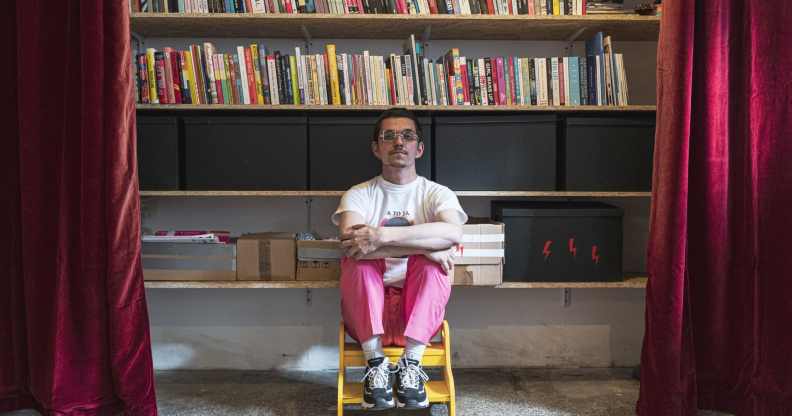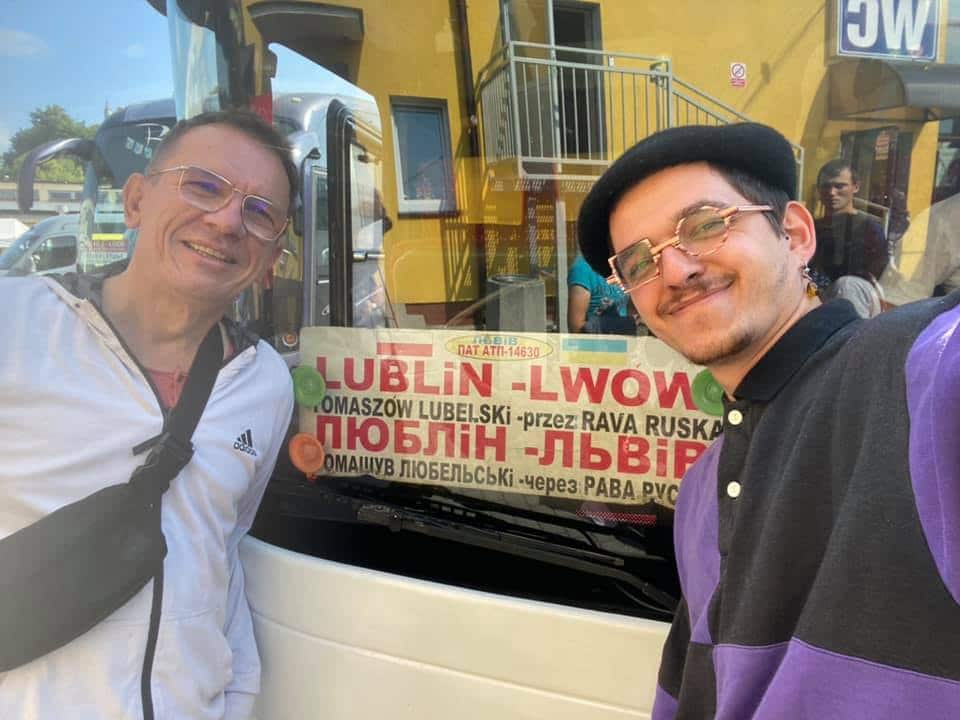Polish LGBT+ library helps queer Ukrainians safely navigate notorious ‘LGBT-free zones’

Filip Kijowski of Biblioteka Azyl is helping queer refugees fleeing Ukraine. (Kijowski)
Filip Kijowski of Biblioteka Azyl is helping queer refugees fleeing Ukraine. (Kijowski)
Since Russia invaded Ukraine on 24 February, more than 2.4 million refugees have fled across the border to Poland.
In order to get to Lublin, the closest major Polish city to the northern border, refugees often have to travel through some of Poland’s so-called “LGBT-free zones”.
These zones began popping up across the country in 2019, with almost 100 municipalities declaring themselves unwelcoming of “LGBT ideology”.
“One of the trans women we were helping asked me: ‘Are we going to be going through those ‘LGBT-free zones’, and what does that mean?” explains Filip Kijowski, 28, co-founder of the LGBT+ library Biblioteka Azyl, based in Lublin.
He and curator Waldemar Tatarczuk, 57, have been working flat-out to assist LGBT+ refugees in finding community, safety and healthcare after leaving Ukraine.
“It’s horrific that they are not only fleeing war and have these traumas, but also have to be worried about being more traumatised by our government,” Kijowski tells PinkNews.
In 2020 “LGBT-free zones” covered a third of Poland; a small handful have since renounced the declarations.
In February, Poland’s parliament passed a law banning so-called “LGBT+ propaganda” in schools across the country. It is illegal for same-sex couples to marry or adopt children, and a 2019 opinion poll found that almost a quarter of the population believes homosexuality must not be tolerated.
Although it is hard to ascertain how many Polish citizens identify as queer, ninety per cent of anti-LGBT attacks go unreported, a 2016 survey found.
Standing against this bigotry as a beacon of hope is exactly why the library was founded last year. The largest of its kind in Poland, it houses more than 1,000 books, all donated by queer authors and publishers from around the world.
When Russia invaded Ukraine, Kijowski knew that he had the framework and connections to begin a “direct response” to the situation.
“We’re assisting people specifically to escape from the war,” he explains. “What I mean by this is we are in touch with drivers who are able to drive into Ukraine… they’re able to drive people out, and I usually meet them at the border.
“We try and create a safe space for them to rest in Poland for a short while, because most of them want to move on, actually, they want to go to Berlin or Sweden. Some want to stay in Poland but it, unfortunately, isn’t the most queer-friendly environment.”

Waldemar Tatarczuk and Filip Kijowski in Lviv, Ukraine, last year. (Kijowski)
The pair have so far assisted more than 20 people, in some cases finding them work and accommodation.
Recently they found a home for “a young trans person and their parents”, and secured work and housing in Berlin for a non-binary refugee and a trans woman.
However, Kijowski stresses it is all about catering to people’s “specific needs”. For instance, they were able to raise the funds to get a new laptop for a graphic designer to continue working after hers was left behind in Ukraine.
Kijowski and Tatarcuk’s daily work includes linking people up with doctors to provide psychological and medical care, as well as securing vital hormones for trans people, which have been donated by the international community.
Some trans people, particularly trans women, are unable to flee the war zone. While Ukrainian trans people are able to have their gender legally recognised, the process is lengthy and some who haven’t completed it are reportedly being turned away at the borders because they have male gender markers.
The Polish pair want to be ready when more Ukrainian LGBT+ people come across the border, so are crowdfunding for their organisation’s move to a larger building in May.
It will be an “LGBTQ+ refugee centre for Ukrainian queer people”, giving people “access to safety, to be able to rest, to have some food, talk with us and talk amongst each other.” It will also house the library.
So far they have raised more than £6,000 on their GoFundMe page.
Kijowski says that the moment that he realised he needed to help came when he was on the phone with a Ukrainian friend and heard sirens in the background.
“I could sense the fear,” he says. “As a queer person, knowing what it’s like to receive support, and having been helped for quite a few years growing up in the queer community, it’s also a responsibility.
“That’s a strong word, but it is a responsibility to be able to at least give doses of that support back into the community.”

